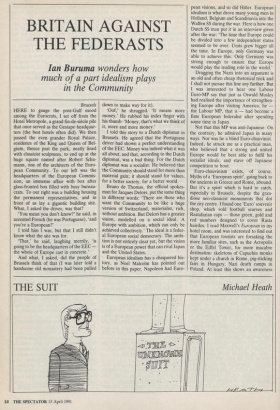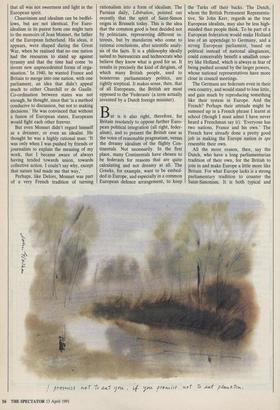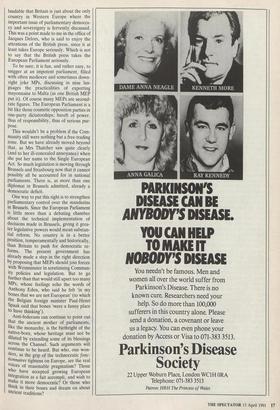BRITAIN AGAINST THE FEDERASTS
Ian Buruma wonders how
much of a part idealism plays in the Community
Brussels HERE to gauge the post-Gulf mood among the Eurocrats, I set off from the Hotel Metropole, a grand fin-de-siècle pile that once served as the Gestapo headquar- ters (the best hotels often did). We then passed the even grander Royal Palace, residence of the King and Queen of Bel- gium, thence past the park, neatly lined with classicist sculptures, to end up at the huge square named after Robert Schu- mann, one of the architects of the Euro- pean Community. To our left was the headquarters of the European Commis- sion, an immense affair with box after glass-fronted box filled with busy bureau- crats. To our right was a building housing the permanent representatives, and in front of us lay a gigantic building site. What, I asked the driver, was that?
`You mean you don't know?' he said, in accented French (he was Portuguese), 'and you're a European?'
I told him I was, but that I still didn't know what the site was for.
`That,' he said, laughing merrily, 'is going to be the headquarters of the EEC the whole of Europe cast in concrete.'
And what, I asked, did the people of Brussels think of that (I was later told a handsome old monastery had been pulled down to make way for it).
`Oof,' he shrugged. 'It means more money.' He rubbed his index finger with his thumb: 'Money, that's what we think of it, more and more money.'
I told this story to a Dutch diplomat in Brussels. He agreed that the Portuguese driver had shown a perfect understanding of the EEC. Money was indeed what it was all about, and that, according to the Dutch diplomat, was a bad thing. For the Dutch diplomat was a socialist. He believed that the Community should stand for more than material gain; it should stand for values, for a better society, for a better world.
Bruno de Thomas, the official spokes- man for Jacques Delors, put the same thing in different words: 'There are those who want the Community to be like a huge version of Switzerland, materialist, rich, without ambition. But Delors has a greater vision, modelled on a social ideal. A Europe with ambition, which can only be achieved collectively.' The ideal is a feder- al European social democracy. The ambi- tion is not entirely clear yet, but the vision is of a European power that can rival Japan and the United States.
European idealism has a chequered his- tory, as Noel Malcolm has pointed out before in this paper. Napoleon had Euro- pean visions, and so did Hitler. European idealism is what drove many young men in Holland, Belgium and Scandinavia into the Waffen SS during the war. Here is how one Dutch SS man put it in an interview given after the war: 'The time that Europe could be divided into a few independent states seemed to be over. Units grew bigger all the time. In Europe, only Germany was able to achieve this. Only Germany was strong enough to ensure that Europe would play the leading role in the world.'
Dragging the Nazis into an argument is an old and often cheap rhetorical trick and I shall not pursue this line any further. But I was interested to hear one Labour Euro-MP say that just as Oswald Mosley had realised the importance of strengthen- ing Europe after visiting America, he the Labour MP, that is — had become a firm European federalist after spending some time in Japan.
Not that this MP was anti-Japanese. On the contrary, he admired Japan in many ways. Nor was he a blind Euro-chauvinist. Indeed, he struck me as a practical man, who believed that a strong and united Europe would be best able to fulfil his socialist ideals, and stave off Japanese competition to boot.
Euro-chauvinism exists, of course. Myths of a 'European spirit', going back to the ancients in Greece and Rome, abound. But it's a spirit which is hard to catch, especially in Brussels, despite the gran- diose neo-classicist monuments that dot the city centre. I found one 'Euro' souvenir shop, which sold football scarves and Rastafarian caps — those green, gold and red numbers designed to cover Rasta hairdos. I read Maxwell's European in my hotel room, and was interested to find out that European tourists are forsaking the more familiar sites, such as the Acropolis or the Eiffel Tower, for more macabre destinatins: skeletons of Capuchin monks kept under a church in Rome, pig-sticking fairs in Hungary, Nazi death camps in Poland. At least this shows an awareness that all was not sweetness and light in the European spirit.
Chauvinism and idealism can be bedfel- lows, but are not identical. For Euro- idealism in its purest form one might turn to the memoirs of Jean Monnet, the father of the European fatherland. His ideas, it appears, were shaped during the Great War, when he realised that no one nation had the resources to stand up against tyranny and that the time had come 'to invent new unprecedented forms of orga- nisation.' In 1940, he wanted France and Britain to merge into one nation, with one parliament, an idea that didn't appeal much to either Churchill or de Gaulle. Co-ordination between states was not enough, he thought, since that 'is a method conducive to discussion, but not to making decisions.' He was convinced that without a fusion of European states, Europeans would fight each other forever.
But even Monnet didn't regard himself as a dreamer, or even an idealist. He thought he was a highly rational man: 'It was only when I was pushed by friends or journalists to explain the meaning of my work, that I became aware of always having tended towards union, towards collective action. I couln't say why, except that nature had made me that way,' Perhaps, like Delors, Monnet was part of a very French tradition of turning rationalism into a form of idealism. The Parisian daily, Liberation, pointed out recently that the spirit of Saint-Simon reigns in Brussels today. This is the idea that the common good is best decided not by politicians, representing different in- terests, but by mandarins who come to rational conclusions, after scientific analy- sis of the facts. It is a philosophy ideally suited to bureaucrats and technocrats who believe they know what is good for us. It results in precisely the kind of dirigism, of which many British people, used to boisterous parliamentary politics, are rightly sceptical. It makes sense, then, that of all Europeans, the British are most opposed to the Pederasts' (a term actually invented by a Dutch foreign minister).
But is it also right, therefore, for Britain resolutely to oppose further Euro- pean political integration (all right, feder- alism), and to present the British case as the voice of reasonable pragmatism, versus the dreamy idealism of the flighty Con- tinentals. Not necessarily. In the first place, many Continentals have chosen to be federasts for reasons that are quite calculating and not dreamy at all. The Greeks, for example, want to be embed- ded in Europe, and especially in a common European defence arrangement, to keep the Turks off their backs. The Dutch, whom the British Permanent Representa- tive, Sir John Kerr, regards as the true European idealists, may also be less high- minded than people think. To be part of a European federation would make Holland less of an appendage to Germany, and a strong European parliament, based on political instead of national allegiances, could conceivably benefit a smallish coun- try like Holland, which is always in fear of being pushed around by the larger powers, whose national representatives have more clout in council meetings.
The Germans are federasts even in their own country, and would stand to lose little, and gain much by reproducing something like their system in Europe. And the French? Perhaps their attitude might be summed up in a French phrase I learnt at school (though I must admit I have never heard a Frenchman say it): 'Everyone has two nations, France and his own.' The French have already done a pretty good job in making the Europe nation in spe resemble their own.
All the more reason, then, say the Dutch, who have a long parliamentarian tradition of their own, for the British to join in and make Europe a little more like Britain. For what Europe lacks is a strong parliamentary tradition to counter the Saint-Simonism. It is both typical and laudable that Britain is just about the only country in Western Europe where the important issue of parliamentary democra- cy and sovereignty is fervently discussed. This was a point made to me in the office of Jacques Delors, who is said to enjoy the attentions of the British press, since it at least takes Europe seriously. Which is not to say that the British press takes the European Parliament seriously.
To be sure, it is fun, and rather easy, to snigger at an impotent parliament, filled with often mediocre and sometimes down- right joke MPs, discussing in nine lan- guages the practicalities of exporting mayonnaise to Malta (as one British MEP put it). Of course many MEPs are second- rate figures. The European Parliament is a bit like those cosmetic opposition parties in one-party dictatorships; bereft of power, thus of responsibility, thus of serious pur- pose.
This wouldn't be a problem if the Com- munity still were nothing but a free-trading zone. But we have already moved beyond that, as Mrs Thatcher saw quite clearly (and to her ill-concealed annoyance) when she put her name to the Single European Act. So much legislation is moving through Brussels and Strasbourg now that it cannot possibly all be accounted for in national parliaments. There is, as more than one diplomat in Brussels admitted, already a democratic deficit.
One way to put this right is to strengthen parliamentary control over the mandarins in Brussels. Since the European Parliament is little more than a debating chamber about the technical implementation of decisions made in Brussels, giving it grea- ter legislative powers would mean substan- tial reform. No country is in a better position, temperamentally and historically, than Britain to push for democratic re- forms. The present government has already made a step in the right direction by proposing that MEPs should join forces with Westminster in scrutinising Commun- ity policies and legislation. But to go further than that would still upset too many MPs, whose feelings echo the words of Anthony Eden, who said he felt 'in my bones that we are not European' (to which the Belgian foreign minister Paul-Henri Spaak said that bones 'were a funny place to have thinking').
Anti-federasts can continue to point out that the ancient mother of parliaments, like the monarchy, is the birthright of the native-born, whose heritage must not be diluted by extending some of its blessings across the Channel. Such arguments will
continue to be heard. But who, one won- ders, as the grip of the technocratic fonc-
ttonnaires tightens on Europe, are the real voices of reasonable pragmatism? Those who have accepted growing European integration as a fait accompli, and wish to make it more democratic? Or those who think in their bones and dream on about ancient traditions?




























































 Previous page
Previous page